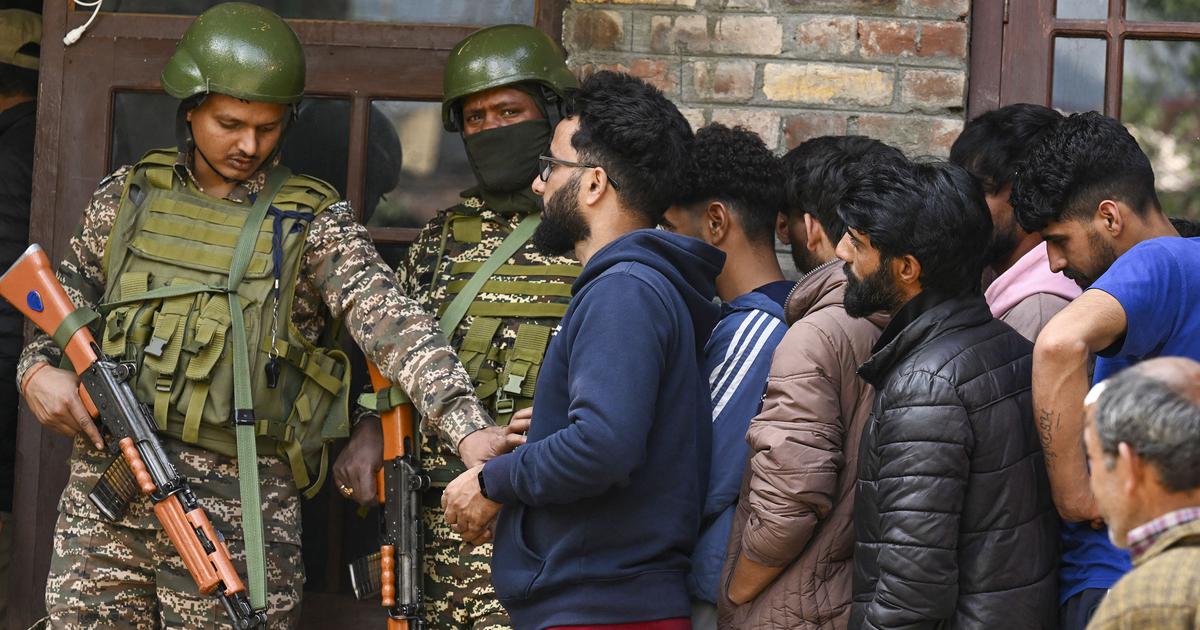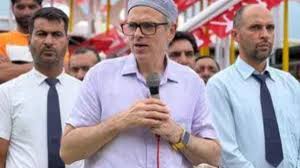In the first general election following the abrogation of Article 370, Jammu and Kashmir’s special status, candidates did not have an easy run as high voter turnout indicated a rejection of prominent political figures and New Delhi’s assertive policy.
The voter turnout in three Kashmir seats (Srinagar, Baramulla, and Anantnag-Rajouri) recorded its highest ever percentage in nearly three decades: 50.86 per cent, as opposed to 19.16 per cent in 2019.
Displaying a fervour otherwise seen only during India-Pakistan cricket matches, people in Kashmir were glued to their TV screens and mobile phones on the day of the results, tracking updates to determine the leading and trailing candidates. While the results of both Kashmir and Ladakh regions revealed an anti-BJP sentiment, the party managed to retain the two seats it won in Jammu in 2019.
According to political analysts, the increased participation of people in Kashmir in the Lok Sabha election was fuelled by a desire to express discontent with the BJP and demonstrate their non-acceptance of the abrogation of Article 370. Professor Sheikh Showkat Hussain, former head of the Department of Legal Studies at the Central University of Kashmir, said that the Kashmir election results followed predicted patterns, with a marked increase in voter turnout compared with previous Lok Sabha elections. He said: “This time, there was a widespread belief among the people that their votes could indeed catalyse substantial change. The decisions taken by New Delhi in August 2019 forced people to vote against the BJP and its Hindutva ideology.”
Wary of the public sentiment on the ground, the BJP refrained from fielding its candidates in any of the three seats in Kashmir. Instead, it opted to test the waters through alleged proxies.
However, these proxies, including Altaf Bukhari’s Apni Party and Sajad Lone’s People’s Conference, were also resoundingly rejected by voters: Lone lost the Baramulla seat to the jailed politician Engineer Rashid by almost three lakh votes, and Zafar Manhas, the Apni Party candidate for the Anantnag-Rajouri seat, lost by nearly four lakh votes. Ghulam Nabi Azad’s Democratic Progressive Azad Party (DPAP) also struggled to gain any traction in the Valley’s political landscape.
Analysts claimed that the discontent against the Centre had also deepened owing to the absence of regional representation in the administration, with bureaucrats from other parts of India managing the former State’s affairs.
Fielding prominent candidates, both the National Conference (NC) and the Peoples Democratic Party (PDP)—the main political parties of Jammu and Kashmir—exhorted voters to view this election as a “referendum” against the abrogation of Article 370. Waheed Para, the PDP candidate in Srinagar, urged Kashmir’s youngsters to send New Delhi a message through this “referendum” that people are quiet but not happy. The 34-year-old Para had been detained under the Unlawful Activities (Prevention) Act (UAPA) for alleged terror links in November 2020, just three days after he filed his nomination for the District Development Council elections in Jammu and Kashmir. He was eventually released from jail after 19 months.
Both the PDP and the NC insisted that the election was being fought not for the development but against the revocation of the special status envisaged in Articles 370 and 35A of the Constitution and the splitting up of the erstwhile State into two Union Territories: Jammu and Kashmir and Ladakh. Yet both parties faced disapproval from voters in the Valley, with former Chief Ministers Omar Abdullah of the NC and Mehbooba Mufti of the PDP losing by huge margins. It will be interesting to see what both Abdullah and Mufti decide, considering that they had declared their intentions not to contest Assembly elections if held this year.
Showkat said that the two former Chief Ministers had been defeated owing to the spate of civilian killings during their terms. He said: “Both of them are linked to over a hundred civilian deaths and numerous injuries from gunfire, prompting the public to penalise them by voting them out this time.” Showkat added that some people, perceiving the NC and the PDP as lesser evils, had voted for some of their candidates in order to prevent the rise of the BJP and its proxies.
Despite his past imprisonment and vigorous campaign, Para lost to the NC’s Aga Syed Ruhullah Mehdi, the only leader in the NC camp who vehemently opposed the Centre’s move to abrogate Article 370. “I was pleased to vote for Mehdi because he has been vocal against the BJP and its policies in Kashmir. I am hopeful he will represent the true sentiments and aspirations of the people in Parliament,” said Ali Mohammad, a 53-year-old shopkeeper in Srinagar.
Mehdi, a Shia cleric, not only gained prominence for his outspoken and fiery speeches against the abrogation of Article 370, but also distanced himself from the party’s policy of maintaining silence over the situation in Jammu and Kashmir. He secured over 3.56 lakh votes, defeating Para by over 1.88 lakh votes. The BJP’s ally, Mohammad Ashraf Mir of Apni Party, could only obtain 65,954 votes.
“The standout moment of this election was the landslide victory of Sheikh Abdul Rashid, popularly known as Engineer Rashid, in Baramulla. Rashid, currently lodged in Delhi’s Tihar Jail, secured over 4.72 lakh votes.”
The standout moment of the results occurred in Baramulla, where a jailed politician emerged as a “dark horse”. Here, the public, especially the youth, turned out in significant numbers to elect Sheikh Abdul Rashid, popularly known as Engineer Rashid. The 57-year-old politician, currently languishing in Delhi’s Tihar Jail, achieved a landslide victory, securing over 4.72 lakh votes.
In August 2019, the two-time legislator and former MLA from Kupwara’s Langate Assembly constituency was arrested by the National Investigation Agency in a terror funding case, marking the first instance of a mainstream politician being booked under the UAPA.
With no prior political experience, Rashid’s 26-year-old son, Abrar Rashid Sheikh, led the campaign with vibrancy and emotion, drawing huge crowds to his rallies, and ultimately votes.
Sheikh said the campaign slogan “Jail ka badla vote se (avenge the jailing with the vote)“ garnered significant support, inspiring crowds to vote for Rashid and in the name of hundreds of prisoners in jails across the country.
With separatists not calling for a boycott of the election this time, people across the Valley, especially in militancy-prone areas, turned out to vote in large numbers. The Baramulla constituency saw a record turnout of 54.21 per cent, which was higher than Mumbai’s 48.88 per cent.
Anuradha Bhasin, executive editor of Kashmir Times, told Frontline that the three regions—Jammu, Kashmir, and Ladakh—demonstrated distinct voting patterns. “In Kashmir Valley the resounding victories of the incarcerated Rashid, alongside senior NC leaders Mian Altaf and Mehdi, clearly demonstrate a changing mindset among voters, particularly noticeable among first-time voters and women.”
Alhough Mufti’s campaign was energetically spearheaded by her 37-year-old daughter, Iltija Mufti, her party failed to clinch a single seat in Kashmir.
The victory of Mian Altaf, the NC’s prominent spiritual leader and a key figure among the Bakarwal and Pahari communities, over MehboobaMufti in Anantnag-Rajouri could be attributed to his significant Gujjar-Pahari vote bank in the Pir Panjal. Mehbooba Mufti’s consecutive defeats in 2019 and 2024 have highlighted the tarnished public image of the PDP thanks to its “unholy alliance” with the BJP in 2015.
In fact, every time Mehbooba Mufti posts anything critical of the government on X, people in the Valley remind her of how she was the one who brought the BJP to Jammu and Kashmir by forming an alliance with the p-arty.
A senior journalist from south Kashmir said that the PDP suffered significantly after the Anantnag seat was redrawn during the 2022 delimitation exercise. He explained: “Both Pulwama and Shopian districts, considered the PDP’s stronghold, were removed from the Anantnag seat and added to Srinagar, leading to a substantial loss of vote share for Mehbooba Mufti.”
Despite retaining the Jammu and Udhampur seats, the BJP suffered a decline in its vote share. The BJP’s Jugal Kishore received 6,87,588 votes compared with the 5,52,090 votes garnered by Congress leader Raman Bhalla. Similarly, Union Minister Jitendra Singh received 5,71,076 votes, while the Congress candidate Choudhary Lal Singh secured 4,46,703 votes.
Immediately after the results, Lal Singh declared his intention to challenge the BJP in the upcoming Assembly election. “We contested the elections in the first phase, with only 20 days of preparation, and faced unfavourable conditions. Yet, despite these challenges, people showered their blessings, and I secured 4,46,703 votes, indicating the discontent of the youth and the poor against the present government.”
Bhasin, who is also the author of A Dismantled State: The Untold Story of Kashmir After Article 370, said that while the BJP managed to retain its seat in Jammu, its vote share had declined greatly. She explained: “During the past decade, Jammu was swayed by the Modi wave, and there was also resentment against regional parties, which aided the saffron party in maintaining its influence in the region.”
The single Lok Sabha seat in Ladakh was secured by an Independent, Mohmad Haneefa Jan. This Kargil resident won by over 27,000 votes.The BJP had replaced its incumbent MP, Jamyang Tsering Namgyal, and nominated Tashi Gyalson as its Lok Sabha candidate.
Sajjad Kargili, a social-political activist from Ladakh, said that this time the people of Ladakh regarded the Lok Sabha election as a referendum on New Delhi’s decisions. He said: “People voted for an independent candidate to express their anger over New Delhi’s decision to first abrogate Article 370 and then separate Ladakh from Jammu and Kashmir. The people of Ladakh have long been upset with these decisions, but the government has ignored their pleas. Our demands to either unify Ladakh with Jammu and Kashmir, grant separate statehood for Ladakh, or include it in the Sixth Schedule of the Constitution, continue to be ignored.”
Bhasin noted that the voting pattern in Ladakh revealed a division along subregional lines, with the Kargil subregion fielding its own candidate despite opposition from political parties.
Kargili, however, argued that the power shift in Ladakh was significant and a positive development. “For the first time since 2014, a representative from Kargil will lead Ladakh as a Member of Parliament. The lack of representation from Kargil resulted in deprivation and substantial developmental challenges in the area.” Source



